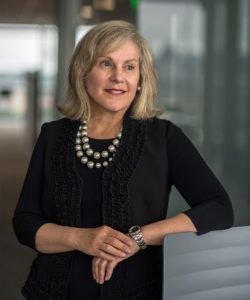How to Lead in Health Care During a Pandemic

To work in health care is to be on the front lines of truly trying times.
“Every time I think we should stop saying we’re living in unprecedented times, something else happens in the world. We are truly living through a moment in history,” says Donna Levin, CEO of The Arthur M. Blank School for Entrepreneurial Leadership at Babson College. “We know it has been particularly challenging for anyone in the healthcare field.”
Lynn Stofer, however, has found reasons for hope and uplift during the pandemic’s disruption and uncertainty. She’s the president of the Mass General Brigham Community Physicians, a network of close to 2,100 doctors, spread across approximately 250 practice locations in Massachusetts.
Stofer has seen doctors and nurses celebrate as they received the long-awaited COVID-19 vaccine, and she has witnessed her middle managers rise to the occasion of the ongoing crisis and grow into leaders. “I really have seen the best in people,” she says.

Stofer also notes that applications to medical schools have risen sharply in what has been called the “Fauci Effect,” as young adults have found themselves inspired by Dr. Anthony Fauci and other clinicians. “That brings a lot of cheer and joy to me that people are going into it for the right reasons to help other people and be part of the future and be part of the healing,” she says.
In a session last month entitled “Leading Through Adversity,” Stofer talked with Levin as part of the Winter Series of Babson’s Entrepreneurial Leadership Village. The ELV is a place, both physical and virtual, where the Babson community, its extended ecosystem, and people around the world come together to learn, collaborate, and take action.
In a wide-ranging conversation, Stofer talked about her experiences in health care during the pandemic and how she has led with her values and remained optimistic about the future. “I’m optimistic about what will come out of this,” she says. “Together, we will come out stronger.”
Stay Calm
As the pandemic took hold last March, and uncertainty gripped the country, Stofer’s first task was communication. She and her team set up regular sessions with doctors in her organization to listen and share information.
“It was really complicated. It was really daunting,” she says of the early days of the pandemic. “The first thing I wanted to get across to everyone was a sense of calm. I think it was really important to get the message across that we’re going to be OK. We’re going to get through this. We’re all in this together.”
She listened as doctors opened up about their worries and fears. “Physicians aren’t usually used to doing that,” she says. “They usually have all the answers.”
Physicians were worried not only about how they would care for their patients but also how they would keep the doors of their practices open. “We walked hand in glove with them to say, here’s how you get your small business loan. Here’s the number to call if you have any problems,” Stofer says. “I’m really proud to say that all of our doctors are still practicing today. None of them had to close their practices.”
Move Fast
Faced with crisis, Stofer and other healthcare leaders have had to move fast. “This crisis in front of us really helped us to transition and make decisions,” she says. “Some of them weren’t the best decisions I would imagine, but we made them very thoughtfully and quickly.”
“This crisis in front of us really helped us to transition and make decisions. Some of them weren’t the best decisions I would imagine, but we made them very thoughtfully and quickly.”
Lynn Stofer
Case in point was telemedicine, which has been a long-simmering trend in health care. As people went into quarantine, telemedicine suddenly became an indispensable tool for doctors and patients. At one point, doctors in her organization were doing about 85 percent of their patient appointments using the technology, and Stofer believes that telemedicine is here to stay and will be a part of doctors’ practices going forward.
Without the pandemic, the implementation of telemedicine would have taken a lot of time and discussion. “In the past, decisions to stand up telehealth or remote work from home would have been a 2½-year process,” she says.
Lead with Values
Stofer strives to lead her organization by a set of values, such as empathy, integrity, and the belief that people should look after each other.
She knows her team is exhausted and has experienced the loss of family members to COVID-19. She wants them to take care of themselves. “I would tell them, if you need to take a day off during the week, just go,” she says. “Just tell me you’re not going to be around Wednesday, and go for a walk, be with your family, do something, so that you could be a better leader tomorrow.”
As a child, people are taught to do the right thing, and as leaders, Stofer believes that impulse to do the right thing should still be a guiding principle.
“I really believe we can do anything together,” Stofer says, “and living by the values you were taught as a child really helps with leadership and moving your organization forward at a time like this, with the adversity that we’re all experiencing.”
Posted in Insights




